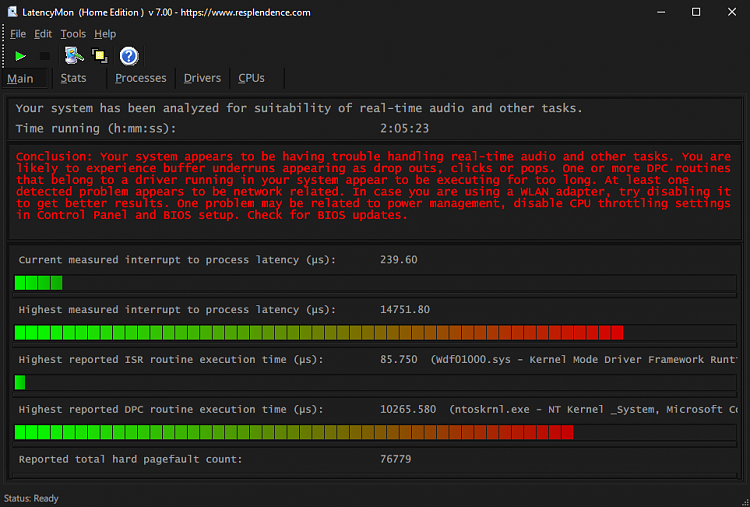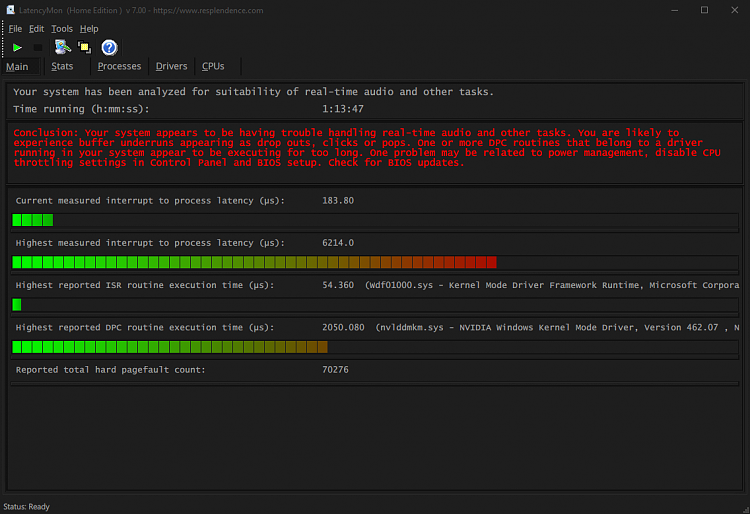New
#1
Audio Crackling/Popping and DPC Latency Issues
Hi,
I seem to get Audio Crackling and Popping issues, after searching the web for a bit I noticed that this issue is generally tied to DPC Latency so I used LatencyMon to recorded for around 2 hours (stats below).
In my case it doesn't seem to happen immediately after start up generally around an hour of usage and I can easily notice it when video and audio during playback is desynced (and it happens gradually and usually ends with audio being 3ish seconds ahead of video) then the audio crackling begins.
I have tried a variety of solution including; upgrade/downgrading bios, updating/uninstalling/downgrading drivers for audio and gpu, disable HPET and dynamicTick, uninstalling updates or downloading the newest updates, etc. The usual steps to resolve issues. Unfortunately, nothing seems to help me in that regard and I haven't been able to find the cause.
Hopefully someone here can provide some suggestion on steps I should take to help resolve this issue.
Computer Info:
Mobo: MSI B550m Mortar Wifi
CPU: Ryzen 5 3600
GPU: Nvidia GTX 3060ti
Memory: Team Vulcan TUF Gaming DDR4-3200 (4x8GB)
Windows 10 20H2 OS Build: 19042.870
The soundcard itself is the one onboard. I have included the latest screenshot of LatencyMon and its stat page. Let me know if you would like more information.
____________________________________________________________________________________________________ ___
__
CONCLUSION
____________________________________________________________________________________________________ ___
__
Your system appears to be having trouble handling real-time audio and other tasks. You are likely to
experience buffer underruns appearing as drop outs, clicks or pops. One or more DPC routines that
belong to a driver running in your system appear to be executing for too long. At least one detected
problem appears to be network related. In case you are using a WLAN adapter, try disabling it to get
better results. One problem may be related to power management, disable CPU throttling settings in
Control Panel and BIOS setup. Check for BIOS updates.
LatencyMon has been analyzing your system for 2:05:23 (h:mm:ss) on all processors.
____________________________________________________________________________________________________ ___
__
SYSTEM INFORMATION
____________________________________________________________________________________________________ ___
__
Computer name: DESKTOP-10PE5RG
OS version: Windows 10, 10.0, version 2009, build: 19042
(x64)
Hardware: MS-7C94, Micro-Star International Co., Ltd.
CPU: AuthenticAMD AMD Ryzen 5 3600 6-Core Processor
Logical processors: 12
Processor groups: 1
RAM: 32694 MB total
____________________________________________________________________________________________________ ___
__
CPU SPEED
____________________________________________________________________________________________________ ___
__
Reported CPU speed: 360 MHz
Note: reported execution times may be calculated based on a fixed reported CPU speed. Disable variable
speed settings like Intel Speed Step and AMD Cool N Quiet in the BIOS setup for more accurate results.
____________________________________________________________________________________________________ ___
__
MEASURED INTERRUPT TO USER PROCESS LATENCIES
____________________________________________________________________________________________________ ___
__
The interrupt to process latency reflects the measured interval that a usermode process needed to
respond to a hardware request from the moment the interrupt service routine started execution. This
includes the scheduling and execution of a DPC routine, the signaling of an event and the waking up of
a usermode thread from an idle wait state in response to that event.
Highest measured interrupt to process latency (Ás): 14751.80
Average measured interrupt to process latency (Ás): 7.605939
Highest measured interrupt to DPC latency (Ás): 14748.10
Average measured interrupt to DPC latency (Ás): 4.084324
____________________________________________________________________________________________________ ___
__
REPORTED ISRs
____________________________________________________________________________________________________ ___
__
Interrupt service routines are routines installed by the OS and device drivers that execute in response
to a hardware interrupt signal.
Highest ISR routine execution time (Ás): 85.750
Driver with highest ISR routine execution time: Wdf01000.sys - Kernel Mode Driver Framework
Runtime, Microsoft Corporation
Highest reported total ISR routine time (%): 0.003416
Driver with highest ISR total time: Wdf01000.sys - Kernel Mode Driver Framework
Runtime, Microsoft Corporation
Total time spent in ISRs (%) 0.003416
ISR count (execution time <250 Ás): 4949409
ISR count (execution time 250-500 Ás): 0
ISR count (execution time 500-1000 Ás): 0
ISR count (execution time 1000-2000 Ás): 0
ISR count (execution time 2000-4000 Ás): 0
ISR count (execution time >=4000 Ás): 0
____________________________________________________________________________________________________ ___
__
REPORTED DPCs
____________________________________________________________________________________________________ ___
__
DPC routines are part of the interrupt servicing dispatch mechanism and disable the possibility for a
process to utilize the CPU while it is interrupted until the DPC has finished execution.
Highest DPC routine execution time (Ás): 10265.580
Driver with highest DPC routine execution time: ntoskrnl.exe - NT Kernel & System, Microsoft
Corporation
Highest reported total DPC routine time (%): 0.229869
Driver with highest DPC total execution time: nvlddmkm.sys - NVIDIA Windows Kernel Mode Driver,
Version 461.92 , NVIDIA Corporation
Total time spent in DPCs (%) 0.449850
DPC count (execution time <250 Ás): 39259699
DPC count (execution time 250-500 Ás): 0
DPC count (execution time 500-10000 Ás): 65331
DPC count (execution time 1000-2000 Ás): 12
DPC count (execution time 2000-4000 Ás): 30
DPC count (execution time >=4000 Ás): 6
____________________________________________________________________________________________________ ___
__
REPORTED HARD PAGEFAULTS
____________________________________________________________________________________________________ ___
__
Hard pagefaults are events that get triggered by making use of virtual memory that is not resident in
RAM but backed by a memory mapped file on disk. The process of resolving the hard pagefault requires
reading in the memory from disk while the process is interrupted and blocked from execution.
NOTE: some processes were hit by hard pagefaults. If these were programs producing audio, they are
likely to interrupt the audio stream resulting in dropouts, clicks and pops. Check the Processes tab to
see which programs were hit.
Process with highest pagefault count: msmpeng.exe
Total number of hard pagefaults 76779
Hard pagefault count of hardest hit process: 11989
Number of processes hit: 60
____________________________________________________________________________________________________ ___
__
PER CPU DATA
____________________________________________________________________________________________________ ___
__
CPU 0 Interrupt cycle time (s): 721.097961
CPU 0 ISR highest execution time (Ás): 85.750
CPU 0 ISR total execution time (s): 1.036225
CPU 0 ISR count: 1650122
CPU 0 DPC highest execution time (Ás): 2345.580
CPU 0 DPC total execution time (s): 378.732973
CPU 0 DPC count: 35312978
____________________________________________________________________________________________________ ___
__
CPU 1 Interrupt cycle time (s): 100.271767
CPU 1 ISR highest execution time (Ás): 12.790
CPU 1 ISR total execution time (s): 1.015674
CPU 1 ISR count: 1500782
CPU 1 DPC highest execution time (Ás): 7559.780
CPU 1 DPC total execution time (s): 20.329019
CPU 1 DPC count: 1897628
____________________________________________________________________________________________________ ___
__
CPU 2 Interrupt cycle time (s): 50.027886
CPU 2 ISR highest execution time (Ás): 7.160
CPU 2 ISR total execution time (s): 0.090513
CPU 2 ISR count: 104869
CPU 2 DPC highest execution time (Ás): 215.150
CPU 2 DPC total execution time (s): 1.463935
CPU 2 DPC count: 407941
____________________________________________________________________________________________________ ___
__
CPU 3 Interrupt cycle time (s): 46.290205
CPU 3 ISR highest execution time (Ás): 5.010
CPU 3 ISR total execution time (s): 0.044678
CPU 3 ISR count: 48883
CPU 3 DPC highest execution time (Ás): 1105.40
CPU 3 DPC total execution time (s): 0.727993
CPU 3 DPC count: 240668
____________________________________________________________________________________________________ ___
__
CPU 4 Interrupt cycle time (s): 49.749873
CPU 4 ISR highest execution time (Ás): 5.760
CPU 4 ISR total execution time (s): 0.000765
CPU 4 ISR count: 797
CPU 4 DPC highest execution time (Ás): 207.620
CPU 4 DPC total execution time (s): 0.642534
CPU 4 DPC count: 224781
____________________________________________________________________________________________________ ___
__
CPU 5 Interrupt cycle time (s): 42.804415
CPU 5 ISR highest execution time (Ás): 2.210
CPU 5 ISR total execution time (s): 0.000083
CPU 5 ISR count: 85
CPU 5 DPC highest execution time (Ás): 188.860
CPU 5 DPC total execution time (s): 0.236624
CPU 5 DPC count: 90969
____________________________________________________________________________________________________ ___
__
CPU 6 Interrupt cycle time (s): 47.821343
CPU 6 ISR highest execution time (Ás): 2.380
CPU 6 ISR total execution time (s): 0.000036
CPU 6 ISR count: 28
CPU 6 DPC highest execution time (Ás): 189.320
CPU 6 DPC total execution time (s): 0.492780
CPU 6 DPC count: 153232
____________________________________________________________________________________________________ ___
__
CPU 7 Interrupt cycle time (s): 45.385683
CPU 7 ISR highest execution time (Ás): 0.0
CPU 7 ISR total execution time (s): 0.0
CPU 7 ISR count: 0
CPU 7 DPC highest execution time (Ás): 225.670
CPU 7 DPC total execution time (s): 0.255315
CPU 7 DPC count: 83451
____________________________________________________________________________________________________ ___
__
CPU 8 Interrupt cycle time (s): 51.064874
CPU 8 ISR highest execution time (Ás): 6.480
CPU 8 ISR total execution time (s): 0.244546
CPU 8 ISR count: 504409
CPU 8 DPC highest execution time (Ás): 10265.580
CPU 8 DPC total execution time (s): 0.635158
CPU 8 DPC count: 203570
____________________________________________________________________________________________________ ___
__
CPU 9 Interrupt cycle time (s): 46.948170
CPU 9 ISR highest execution time (Ás): 4.260
CPU 9 ISR total execution time (s): 0.035395
CPU 9 ISR count: 57888
CPU 9 DPC highest execution time (Ás): 10264.320
CPU 9 DPC total execution time (s): 0.329215
CPU 9 DPC count: 112626
____________________________________________________________________________________________________ ___
__
CPU 10 Interrupt cycle time (s): 59.317185
CPU 10 ISR highest execution time (Ás): 5.220
CPU 10 ISR total execution time (s): 0.184837
CPU 10 ISR count: 309045
CPU 10 DPC highest execution time (Ás): 10264.60
CPU 10 DPC total execution time (s): 0.930
CPU 10 DPC count: 255884
____________________________________________________________________________________________________ ___
__
CPU 11 Interrupt cycle time (s): 58.991265
CPU 11 ISR highest execution time (Ás): 6.110
CPU 11 ISR total execution time (s): 0.431375
CPU 11 ISR count: 772501
CPU 11 DPC highest execution time (Ás): 7576.350
CPU 11 DPC total execution time (s): 1.335925
CPU 11 DPC count: 341350
____________________________________________________________________________________________________ ___
__



 Quote
Quote





